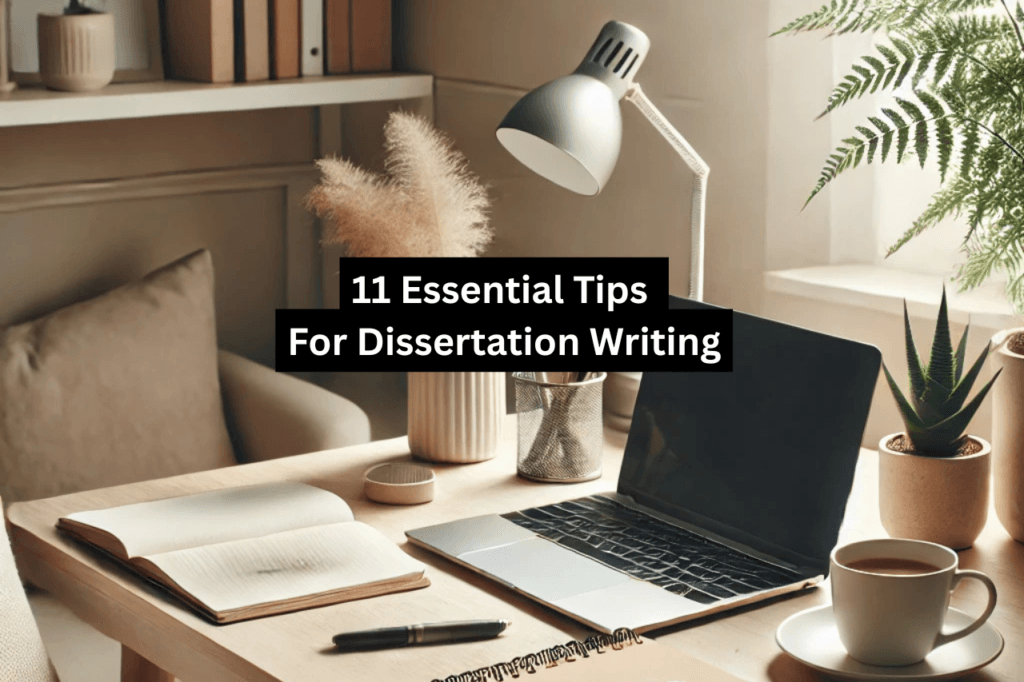Dissertation writing is a Herculean task; presenting months of your research into a structured, condensed writing can be an overwhelming at times. Writing a dissertation can feel like assembling the pieces of an unassembled puzzle. However, with the effective strategy and right approach, writing a dissertation becomes much easier.
Every good research paper has certain qualities—strong research, good and clear writing, and a streamlined structure. With an effective strategy and the right approach, the process of writing a dissertation with all these qualities becomes much easier. In this article, we will look at essential tips for dissertation writing that will guide you step-by-step on how to write a dissertation that gets you the due appreciation.
A dissertation is the final step before getting your master’s or PhD. It is a final test of your research skills, analytical skills, or overall knowledge of the area of your interest. A well-written dissertation proves your academic credibility and is a testimony to your critical thinking, research, and writing skills, besides being a final test before you achieve a new milestone. But under pressure due to its importance, people make some common mistakes in writing their dissertation. The following tips will help you in writing a good dissertation.
Table of Contents
What is a Dissertation?
A dissertation is a comprehensive research project submitted as part of a master’s or doctoral degree, presenting original findings on a specific topic. As per the University of Westminster, a dissertation is a research project completed as part of an undergraduate or postgraduate degree that presents your findings in response to a question that is posed.
A dissertation is the student’s contribution to a field that comes through a thorough analysis of a topic or question in detail. It usually requires in-depth research and meaningful insights. It further inspires future research and academic discussions.
There is difference between dissertation and thesis. A dissertation is typically written for a doctoral degree, presenting original research, while a thesis is usually for a master’s degree, showcasing a deeper understanding of existing research.
11 Essential Tips for Dissertation Writing

1. Choose a Manageable Topic
The first step to begin with while writing a dissertation is to select a topic that not only aligns with your area of research but also interests you as well. Selecting a topic solely based on your area of research can make your work boring and monotonous. On the other hand, working on something that you enjoy will make the work easier.
- While selecting a topic, pragmatism in the sense of time management, scope of research, future consequences of research, availability of research material, etc., should be kept in mind.
- Once you have some ideas in mind, it is suggested to discuss them with your professors or supervisors for their guidance and approval.
- Also Read How to Select a Topic for Your Dissertation
2. Create a Clear Research Proposal
A research proposal is a document that explains the nature and extent of your research. A research proposal includes your research questions, proposed methodology, and the timeline of research, along with the implications or outcomes of the research. It is usually submitted to be reviewed by the supervisor or professor. If done rightly, it becomes your roadmap for research.
- Having a clear and comprehensive research proposal thus helps you in not just getting the approval but also in conducting your research. It defines the scope of research through the questions, streamlines the methodology to be adopted, and highlights the significance of your contributions by defining the future implications of your research.
- It is advisable to start working on your proposal timely, because it is only the first step in the long and arduous journey of a researcher. If you find yourself struggling to come up with a research proposal, you may take the help of platforms such as Assignment Helper or Online Assignment Help, which has an expert and dedicated team to help you with your Dissertation Writing.
- Also Read How to write a Research Dissertation Proposal
3. Develop a Strong Thesis Statement
A well-written thesis statement is the base for your dissertation. It guides the research and gives direction to your work, apart from defining the scope and crux of your work.
- A well-written thesis statement should be clear, concise, and arguable. It should be short but must clearly express your position in the work. Your thesis question must always be stated in your introduction and must give a hint towards your conclusion. It must generate interest in your readers to read more of your work.
- However, as your research progresses, a revisit to your thesis statement might be needed. Your statement should embody the evolution of your ideas and insights and reflect the feedback you receive.
4. Plan and Schedule Your Tasks
Research is a time-taking process that may often stretch beyond your visions. Thus, effective time management is crucial to the completion of your dissertation in a timely manner.
- For this, you can use a calendar or app to keep track of your daily goals and progress.
- You may also try to break down your work into different parts and work on one at a time.
- While allotting time for each section, make sure to leave some time for final revisions and improvements if any.
- Recomended Resources: Trello or Notion for effective task management.
5. Get Expert Help
While writing your dissertation, you can always seek help, especially from your professors, mentors, or other scholars, to make your work manageable. A neutral perspective from a resourceful person may give a new perspective to your work.
- Additionally, when you find yourself struggling with deadlines, referencing, analyzing data, structuring arguments, etc., you may avail yourself of the help of platforms such as Assignment Helper.
- Check Sample Research Proposal
6. Conduct Thorough Research
Effective research is the bedrock of a good dissertation. The stronger the research, the better the dissertation turns out to be.To make your research more credible, proper utilization of academic journals, books, credible websites, etc. must be made.
- For organizing your research, tools like Zotero and Mendeley can be helpful by providing the citations in the right format.
- The purpose of doing all this is to make sure that your dissertation is reliable and supported by previous research and is not just making tall claims.
7. Stay Organized With Notes and References
If you do not cite your sources properly and in real-time, you may lose track of your references. Thus, creating separate folders for research articles, notes, and drafts can help in keeping relevant information organized. Management tools like Zotero or Mendeley can also help in streamlining citations and bibliography formatting, ensuring ease and accuracy at the same time.
8. Write a Strong Introduction and Conclusion
The introduction is your first opportunity to hook a reader. If the introduction is not good enough, people are not very likely to read any further. A good introduction should briefly outline the topic, objectives, and significance of the research.
- You can also make a brief mention about the research question to help readers in understanding the significance of the question that you are dealing with. However, try not to make the introduction overly broad. It must be restricted to giving a glimpse of your writing.
- Similarly, the conclusion is the last part of your dissertation. A good conclusion should ideally summarize all the key findings, contributions, recommendations, future consequences, etc. But more importantly, a conclusion, as the name suggests, should be an ending note and must not suggest new ideas.
9. Edit and Proofread Carefully
After writing the first draft of the dissertation, proofreading and editing shape the final outcome. This switch from writer to proofreader needs time. Thus, it is suggested that one should take some time to enter into the shoes of a proofreader and start with a new perspective.
- Grammatical errors can be very off-putting in any scholarly writing. To avoid any grammatical and other minor errors, you can use tools like Grammarly, Quill-bot, spell-check, etc.
Once you are ready with your final draft, you can send it to your peers, colleagues, other scholars, professors, etc., for further review.
10. Seek Feedback From Peers and Mentors
Feedback from others can be useful in bringing new perspective, refining arguments, bringing clarity, and overall improvement. Seeking input from mentors, professors, peers, other academicians, etc., may help in further strengthening the dissertation and overall research. It may also help in recognizing the possible mistakes and their solutions.
- If direct help is not available from the scholarly community, platforms like OAH can be used for feedback.
11. Maintain a Healthy Work-Life Balance
A healthy work-life balance is a must for your overall well-being and the smooth progress of your dissertation. Writing a dissertation can often feel monotonous. Thus, to prevent burnouts, taking regular breaks is advisable. Mediation, deep breathing, mindfulness, engaging in hobbies, regular exercise, etc. can help in preventing stress and taking overall care of your mental and physical well-being.
- Regular contact with friends, family, professors, and peers is also helpful if stress becomes too overwhelming.
With an effective implementation of these tips, you can start working on your dissertation. While writing a dissertation, it is important to stay consistent, organized, and take care of oneself. If you feel the need for further support at any stage of dissertation writing, you can seek expert help from platforms like Assignment Helper to meet the highest academic standards.
FAQs on How to Write a Dissertation
1. How to write a dissertation quickly?
Writing a good dissertation does not require any fixed hours. Time management and effective planning can help in writing a dissertation in less time as well. You can try to break the work into smaller tasks, set daily goals, stay consistent, and utilize resources such as Grammarly, Turnitin, Zotero, Assignment Helper, etc., that can make the work easier.
2. How much time does it take to write a dissertation?
Writing a good dissertation usually takes around 3-6 months, but the time would mostly depend on the complexity of the research area, data collection, methodology, your consistency, etc. Seeking help from experts and platforms such as Assignment Helper, time management, etc., can reduce any inadvertent delays.
3. What if I haven’t written a dissertation before?
Many students write a dissertation for the first time in their life. This is not a hurdle, as the success formula still remains the same and achievable. Start with a clear topic, break down your work into portions, and allocate proper time to each section. Consider any constructive criticism and seek help from platforms like Assignment Helper for maximum efficiency.
4. What are some common challenges in writing a dissertation?
Writer’s block, lack of motivation, lack of consistency, struggles with time management, problems with looking for appropriate references, etc., are some common problems faced by everyone while writing a dissertation.
To deal with these issues, setting realistic goals, maintaining a structured schedule, seeking feedback, and refining drafts can be helpful.
5. What are some apps and software that can be helpful in dissertation writing?
There are several apps and software that can be used for assistance while writing a dissertation. Tools such as Google Scholar are helpful in finding the research articles and other material related to various subjects, Grammarly, Quillbot, etc. make work easier by taking care of any grammatical errors. Other tools such as Forest App may help in boosting productivity, while a few others such as Zotero, Mendeley, etc. can be used for organizing your resources.
Use of these resources can make the process of writing much efficient and enjoyable.

